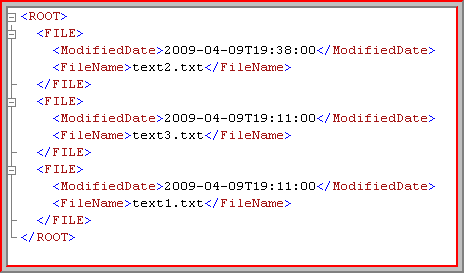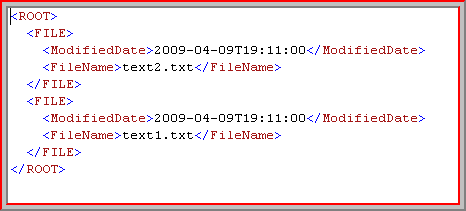By: Divya Agrawal | Comments (8) | Related: > XML
Problem
Sometimes there is a need to process files in a folder, but first you need to determine which files need to be processed compared to older files that have already been processed. There are several ways that this can be done, but in this tip I show you a way this can be done using SQL Server and XML.
To further illustrate the issue I have set this up into three folders:
- Source - files to be processed
- Destination - files that have been processed
- NewFiles - holding folder for new files to be processed after they have been compared
Elaborating the problem in depth, let's say I have three text files (or any type of file) in the Source folder and the Destination folder contains two files. The problem is to identify differences between the files in the Source and Destination folders and copy all the modified or new files from the Source Folder to the folder NewFiles.
Shown below are the set of files with their modified date in the Source folder:

Shown below are the set of files with their modified date in Destination folder:

Looking at the images above, it is clear that Source Folder contains one extra file ‘text3' and one modified file ‘text2'.
I want to compare the files in these two folders and copy the modified file (text2) and the new file (text3) into folder NewFiles.
Solution
My first task was to get all the files from the specified folder. This can be achieved via the ‘DIR' command of DOS. DOS commands can be executed in SQL Server through xp_cmdshell system stored procedure, but it needs to be configured first.
The below code creates a new stored procedure called "MakeXML" which will create a XML document of all of the files in a folder. The code does a few things which you can either turn on or off as desired.
- It first drops stored procedure MakeXML so it can create a new sp with this name
- It enables xp_cmshell so we can shell out to DOS to get the folder listing
- It does a DIR command against the specified folder with the /O-D parameter to order the list by modified date
- It then inserts the data into a temporary table
- Deletes any rows from this table that are not files that we want to compare
- Parses the modified date
- Parses the filename
- Then it creates this data as a temporary XML object
IF OBJECT_ID (N'MakeXML') IS NOT NULL
DROP PROCEDURE MakeXML
GO
-------INPUT THE FILEPATH FOLDER AND IT WILL RETURN AN XML
CREATE PROCEDURE MakeXML
@FilePath VARCHAR(2000),
@xmlFile XML OUTPUT
AS
DECLARE @myfiles TABLE (MyID INT IDENTITY(1,1) PRIMARY KEY,FullPath VARCHAR(2000),ModifiedDate datetime, FileName VARCHAR(100))
DECLARE @CommandLine VARCHAR(4000)
----Configure xp_cmdshell in 2005
-- To allow advanced options to be changed.
EXEC sp_configure 'show advanced options', 1
-- To update the currently configured value for advanced options.
RECONFIGURE
-- To enable the feature.
EXEC sp_configure 'xp_cmdshell', 1
-- To update the currently configured value for this feature.
RECONFIGURE
----- run dir command on the path specified by ordering on the date modified
SELECT @CommandLine =LEFT('dir "' + @FilePath + '" /O-D',10000)
------use xp_cmdshell stored procedure to run dos commands
INSERT INTO @MyFiles (FullPath)
EXECUTE xp_cmdshell @CommandLine
------Delete all the files that are other than .txt or can specify the file type you want to compare on
DELETE FROM @MyFiles WHERE fullpath IS NULL
OR Fullpath NOT LIKE '%.txt%'
------Separate the modified date from the fullpath
UPDATE @myfiles SET ModifiedDate=SUBSTRING(fullpath,1,PATINDEX('%[AP]M%',fullpath)+1)
------Separate out FileName from fullpath
UPDATE @myfiles SET FileName=SUBSTRING(fullpath,40,LEN(fullpath))
-----Make an xml out of separated ModifiedDate,FileName columns and SET the OUTPUT parameter
SELECT @xmlFile=(SELECT ModifiedDate,FileName
FROM @MyFiles FOR
XML PATH('FILE'),
ROOT('ROOT')
)
GO
For our example the stored procedure would return XML for the Source folder ordered on modified date as shown below.

For our example the stored procedure would return XML for the Destination folder ordered on modified date as shown below.

Now, the next task is to compare the two XML documents from Source and Destination, this is achieved by the following stored procedure.
It takes three input parameters
- @Sourcepath which is ‘D:\Source'
- @DestPath is ‘D:\Destination' and
- @NewFilesPath as ‘D:\NewFiles'
IF OBJECT_ID (N'CompareXML') IS NOT NULL
DROP PROCEDURE CompareXML
GO
--------COMPARE XML
CREATE PROCEDURE CompareXML
@SourcePath VARCHAR(255),
@DestPath VARCHAR(255),
@NewFilesPath VARCHAR(255)
AS
DECLARE @SourceXML AS XML,@DestXML AS XML
---Call the MakeXML sp to return the XML for Source and Destination Folders
EXECUTE MakeXML @SourcePath,@SourceXML OUTPUT
EXECUTE MakeXML @DestPath,@DestXML OUTPUT
DECLARE @CURSOR_File AS CURSOR
---------Join both the tables retrieved from xml on filename and get all the files having modifieddate mismatch
---------Fetch all the values into a cursor
SET @CURSOR_File= CURSOR
FOR
SELECT A.FNAME
FROM
(
SELECT N.value('ModifiedDate[1]','varchar(100)') AS MDATE ,
N.value('FileName[1]','varchar(100)') AS FNAME
FROM
@SourceXML.nodes('ROOT/FILE') AS X(N)
)A
INNER JOIN
(
SELECT N.value('ModifiedDate[1]','varchar(100)') AS MDATE ,
N.value('FileName[1]','varchar(100)') AS FNAME
FROM
@DestXML.nodes('ROOT/FILE') AS X(N)
)B
ON A.FNAME=B.FNAME
AND A.MDATE<>B.MDATE
UNION
----------Fetch all the extra files in the source folder
SELECT A.FNAME
FROM
(
SELECT N.value('ModifiedDate[1]','varchar(100)') AS MDATE ,
N.value('FileName[1]','varchar(100)') AS FNAME
FROM
@SourceXML.nodes('ROOT/FILE') AS X(N)
)A
LEFT OUTER JOIN
(
SELECT N.value('ModifiedDate[1]','varchar(100)') AS MDATE ,
N.value('FileName[1]','varchar(100)') AS FNAME
FROM
@DestXML.nodes('ROOT/FILE') AS X(N)
)B
ON A.FNAME=B.FNAME
WHERE b.fname IS NULL
DECLARE @file AS VARCHAR(255)
DECLARE @Command AS VARCHAR(500)
--------First copy all the files found mismatched on modified date into @NewFilesPath
OPEN @CURSOR_File
FETCH NEXT FROM @CURSOR_File INTO @file
WHILE @@Fetch_Status=0
BEGIN
SET @Command='xcopy "'+@SourcePath+'\'+ @file+ '" "' + @NewFilesPath + '"'
EXEC xp_cmdshell @Command,no_output
FETCH NEXT FROM @CURSOR_File INTO @file
END
CLOSE @CURSOR_File
DEALLOCATE @CURSOR_File
GO
The CompareXML stored procedure above will first call the ‘MakeXML' sp and get the source and destination xml. It will fetch all the values from the nodes of both the XML documents and make two types of comparison on those.
- First the comparison would be on the basis of filename having different modified date values.
- The second comparison will fetch all the files from Source folder that do not exist in Destination folder.
The output of this is put into a Cursor so that such files are then copied to the ‘NewFiles' folder one by one using the DOS xcopy command.
After the two stored procedures have been created the code is executed as follows:
EXECUTE CompareXML @SourcePath='D:\Source', @DestPath='D:\Destination', @NewFilesPath='D:\NewFiles'
Based on our example the "NewFiles" folder will now look like this.

The NewFiles folder has the same set of files which had a different modified date and the file which was extra in the Source folder. Now, just copy the files from this NewFiles folder to Destination folder.
The problem of comparing files based on modified date and filename has been drastically reduced compared to doing it manually.
Next Steps
- To test this code create three folders (Source, Destination and NewFiles) and create some dummy (txt) files in the source folder and give it a try.:
- To take this a step further you can even compare based on the file size
- The extra or the modified files from ‘Source' folder can be copied directly to the ‘Destination' folder rather than copying them to the ‘NewFiles' folder.
About the author
 Divya Agrawal's bio is coming soon...
Divya Agrawal's bio is coming soon...This author pledges the content of this article is based on professional experience and not AI generated.
View all my tips






